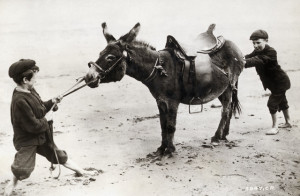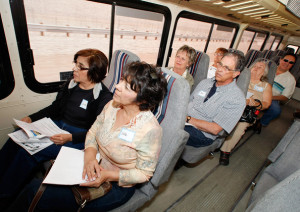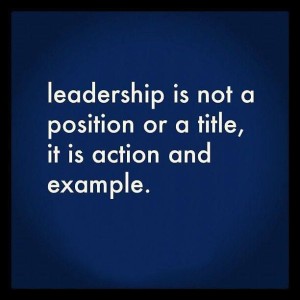Mules, Tourists and Converts:
Know Your Audience!
11/11/2015
Two years ago, I found myself in very uncommon and uncomfortable territory: facing an audience who, unbeknownst to me, had little interest in my topic, and even less interest in active participation. Considering the fact that this wasn't just an hour-long seminar, but a full-day event, we were not off to an auspicious start!
It was my first foray into the world of continuing legal/professional education (CLE/CPE) credit classes for lawyers and accountants**. I had met someone whose company provided the platform to offer and advertise these classes and just needed content providers, so I thought I'd try my material out on this specific demographic. People in these fields are required to log a certain number of credits per year, so I offered my class in December, figuring it would be a good time to catch the procrastinators who needed the credits by year-end deadline; in other words, it seemed like a guaranteed market. But somehow in my research, I missed one key detail: For people to get their credit, the only requirement is that they show up. They don't even need to be conscious while there... and some people arrived with the full intention to take very literal advantage of that loophole.
Some walked in with magazines, novels, catalogs and other paperwork, or laptops, and never once looked up in six hours. Never even acknowledged my existence. Internally, I was stunned that this was considered acceptable, and even the norm. But once this intention and pattern became apparent — which didn't take very long — I had a choice to make.
I could let the energy of the room dictate my energy level and just plod through my material, figuring people weren't listening anyway, or I could “do my thing” the way I always do, and not let my passion for my content be drowned out by the apparent ambivalence of the crowd. In some ways, my emotional intelligence went in a very counter-intuitive direction: I decided to pretend I didn't notice their aura, and continue plowing ahead, undeterred. And little by little I noticed that three distinct groups emerged, who I lovingly refer to as the “Mules,” “Tourists” and “Converts.”

The “Mules” came in with one objective and wouldn't budge no matter what. Now, I can certainly understand having too many past experiences of boring CLE/CPE presenters so that by now they expected to be disappointed, but they weren't even open to being pleasantly surprised. The message they sent was, “I'm not going to like this, I don't want to like this, you can't make me like this, even if I realize there's something that might be interesting or useful, I won't let either of us think I like this. To acknowledge that I like this is to admit that you're right and I'm wrong and that's just not going to happen.” These are the people in your teams who can (and frequently do) suck the life out of a meeting and kill positive energy.


I chose to behave as if everyone was a Convert, or had the potential to be one, and I ignored those who were committed to being a Mule; I refused to let the tail wag the dog. In the end, it worked out really well, and the ones who got on board with me made it a really great experience for everyone.
At the end, one guy came up to me with his 6-inch-thick stack of reading material, and said, “I just wanted to show you this: I came prepared to get all sorts of work done while I was sitting here, and the whole day I never touched it! I think this was the best CLE I ever attended.”
Of course, my role as presenter in that context is different than that of someone leading a team, where you probably can't fully ignore the Mules. But you can recognize who falls into each group and find ways to address whatever issues and challenges stand in the way of anyone's “full conversion.”
Had I known about this dynamic in advance, I probably would have run the event differently. On the other hand, as the expression goes, the best person for the job is often the person who doesn't know what can't be done, as this day proved to be true. But overall, knowing who your audience is and what their motivators are before you show up is a huge advantage to being an effective communicator and mastering the 3Cs of Vocal Executive Presence: Command the room, Connect with the audience, and Close the deal.
So I ask you: who is in your audience?
**Note: Since then, I have done many other programs for professionals in the legal and financial fields and have had a blast with everyone there. But I understand the unique nature of that particular CLE/CPE context, and now I know it's simply not my target market — another incredibly valuable piece of audience information everyone needs to know!



